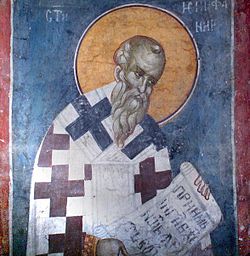Epiphanius of Cyprus
| Epiphanius | |
|---|---|

Icon of St. Epiphanius (Gračanica monastery)
|
|
| Bishop of Salamis (Cyprus), Oracle of Palestine | |
| Born | c. 310–320 Judea |
| Died | 403 (aged 82–93) at sea |
| Venerated in |
Eastern Orthodoxy Oriental Orthodoxy Roman Catholic Church |
| Feast |
12 May 17 Pashons (Coptic Orthodoxy) |
| Attributes | Vested as a bishop in omophorion, sometimes holding a scroll |
Epiphanius of Salamis (Greek: Ἐπιφάνιος; c. 310–320 – 403) was bishop of Salamis, Cyprus, at the end of the 4th century. He is considered a saint and a Church Father by both the Eastern Orthodox and Catholic Churches. He gained a reputation as a strong defender of orthodoxy. He is best known for composing the Panarion, a very large compendium of the heresies up to his own time, full of quotations that are often the only surviving fragments of suppressed texts. According to Ernst Kitzinger, he "seems to have been the first cleric to have taken up the matter of Christian religious images as a major issue", and there has been much controversy over how many of the quotations attributed to him by the Byzantine Iconoclasts were actually by him. Regardless of this he was clearly strongly against some contemporary uses of images in the church.
Epiphanius was born into a Christian Greek family in the small settlement of Besanduk, near Eleutheropolis (modern-day Beit Guvrin, Israel), and lived as a monk in Egypt, where he was educated and came into contact with Valentinian groups. He returned to Palestine around 333, when he was still a young man, and he founded a monastery at Ad nearby, which is often mentioned in the polemics of Jerome with Rufinus and John, Bishop of Jerusalem. He was ordained a priest, and lived and studied as superior of the monastery in Ad that he founded for thirty years and gained much skill and knowledge in that position. In that position he gained the ability to speak in several tongues, including Hebrew, Syriac, Egyptian, Greek, and Latin, and was called by Jerome on that account Pentaglossis ("Five tongued").
...
Wikipedia
